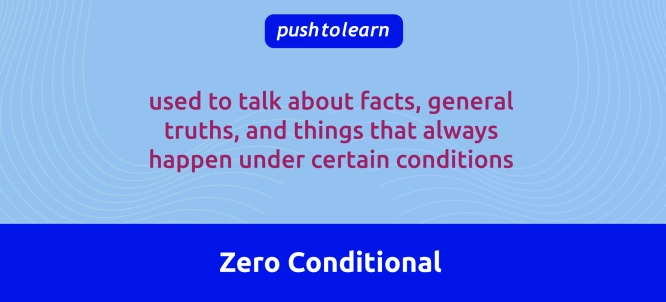by PushtoLearn
Zero Conditional en Inglés: reglas, uso y ejercicios
Tabla de contenidos
Ejercicios del Zero Conditional
Estos ejercicios se centran en el Condicional Cero
TLDR
✔️ Condicional Cero = Hechos y Verdades Generales (If + Presente, Presente)
✔️ Usa "when" en lugar de "if" si el resultado siempre es verdadero
✔️ ¡NUNCA uses "will" en el Condicional Cero!
✔️ Ideal para ciencia, hechos y reglas

¿Qué es el Condicional Cero?
El Zero Conditional describe:
✔️ Hechos científicos → "If you heat water to 100°C, it boils."
✔️ Verdades generales → "If you don’t sleep, you feel tired."
✔️ Reglas e instrucciones → "If the light is red, you stop."
📌 Dato Curioso: El Zero Conditional es 100% seguro—el resultado siempre ocurre.
Estructura del Zero Conditional
👉 If + Presente Simple, Presente Simple
✔️ Ejemplos:
If you mix red and blue, you get purple. (Fact)
If it rains, the ground gets wet. (General truth)
If the sun sets, it gets dark. (Natural law)
📌 Consejo: La cláusula con "if" describe la condición (Presente Simple) y la cláusula principal muestra el resultado (Presente Simple).
Variaciones del Zero Conditional
🔹 Usar "when" en lugar de "if"
✔️ When you eat too much, you feel full.
✔️ When the temperature drops, water freezes.
📌 Consejo: "If" y "when" son intercambiables en el Zero Conditional porque el resultado siempre es verdadero.
🔹 Usar el imperativo en la cláusula de resultado
✔️ If you feel sick, see a doctor.
✔️ If the alarm rings, leave the building.
📌 Consejo: Esto es común para reglas e instrucciones.
Zero Conditional vs. First Conditional
|
Característica |
Zero Conditional |
First Conditional |
|
Significado |
Hechos y verdades generales |
Posibilidades futuras |
|
Estructura |
If + Presente Simple, Presente Simple |
If + Presente Simple, Will + Verbo |
|
Ejemplo |
If you touch fire, you get burned. |
If you touch fire, you will get burned. |
|
Certeza |
100% seguro |
Posible, no seguro |
|
¿Se puede reemplazar "if" por "when"? |
Sí, porque siempre es cierto. |
No, porque el futuro es incierto. |
📌 Consejo: Si el resultado siempre ocurre, usa el Condicional Cero. Si el resultado es posible pero no seguro, usa el Primer Condicional.
Errores Comunes en el Zero Conditional
|
Error |
Incorrecto |
Correcto |
|
Usar "will" en el Condicional Cero |
If you heat ice, it will melt. |
If you heat ice, it melts. |
|
Usar el tiempo pasado |
If you ate too much, you feel sick. |
If you eat too much, you feel sick. |
|
Usar "would" en lugar del presente |
If you press this button, the machine would stop. |
If you press this button, the machine stops. |
📌 Regla: NUNCA uses "will" en el Zero Conditional — el resultado es un hecho, no un evento futuro.
FAQ
¿Puedo usar "will" en el Zero Conditional?
➡️ No. El Zero Conditional describe hechos y verdades generales, que no necesitan "will".
❌ If you heat ice, it will melt.
✅ If you heat ice, it melts.
¿El Zero Conditional puede usar "when" en lugar de "if"?
➡️ Sí.
✔️ If you mix red and yellow, you get orange.
✔️ When you mix red and yellow, you get orange.
¿Puedo usar el Zero Conditional para dar instrucciones?
➡️ Sí. Puedes usar un imperativo en la cláusula de resultado.
✔️ If the alarm rings, leave the building.
¿Cuál es la diferencia entre el Zero Conditional y el First Conditional?
➡️ Zero Conditional = 100% verdadero
➡️ First Conditional = Posible futuro
✔️ Zero Conditional: If you eat too much, you feel sick.
✔️ First Conditional: If you eat too much, you will feel sick.
¿Cuál es el error más común que cometen los estudiantes?
➡️ Usar "will" después de "if".
❌ If you will eat too much, you will feel sick.
✅ If you eat too much, you feel sick.

